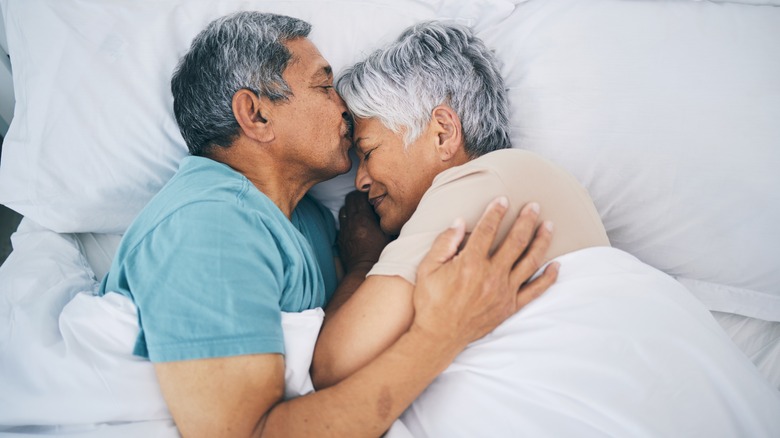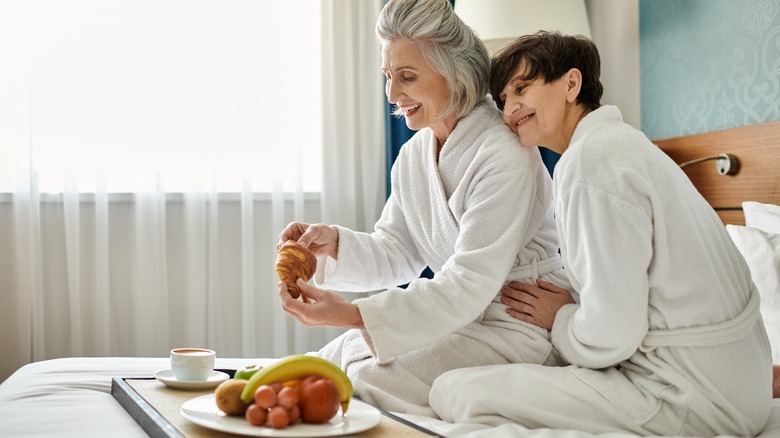Women Over 50 Should Avoid Eating These Foods Before Having Sex
No matter how much we take care of our aging bodies, certain things are difficult to prevent. For example, Botox can only do so much when it comes to wrinkles, your hair will eventually turn shades of grey or white, and your body, well, the aches and pains are just the tip of the iceberg.
For some women, another issue that can arise is incontinence, also known as involuntary urine leakage. According to a continuing education activity published in StatPearls, roughly 13 million people in the U.S. struggle with incontinence, with the majority of those people being of nursing home age. The same study found that 9% to 39% of women over 60 deal with incontinence on a daily basis.
"There are multiple reasons for older women to experience bladder leakage," assistant professor of reproductive biology at Case Western Reserve University Dr. Daisy Hassani exclusively told Health Digest. As Hassani explained, there are two main causes of bladder leakage: stress urinary incontinence and urge urinary incontinence. The former is the result of abdominal pressure, like a sneeze or cough, while the second is an intense urge to urinate that is difficult to control. "Both of these types of leakage get more common with age," said Hassani. But as much as urinary incontinence is common, sometimes it rears its ugly head during the most inconvenient times, like during sex. However, if this is something you're experiencing, there are steps to take to control it.
Don't eat stimulants before sex
Because of where the bladder is, penetrative sex can sometimes result in the bladder getting knocked around a bit. For some people, this pressure can feel good, while for others, it can feel uncomfortable and even induce leakage. That's why, if you know you're going to be having sex, you want to be aware of what you consume.
"Certain foods and drinks can cause bladder irritation, which can cause the bladder to inappropriately squeeze and empty. The reason for why this happens varies and it is not something we fully understand," said Hassani, adding that acidic foods can irritate the lining of the bladder. Acidic foods you want to avoid are things like tomatoes, raw onions, chocolate, spicy food, citrus fruits and beverages, artificial sweeteners, and, of course, coffee. Basically anything that's considered bad for bladder health should be avoided.
But it's also important to realize that this list doesn't apply to everyone and not every woman over 50 who consumes these things prior to sex is going to have an incontinence issue on their hands. "Something that is a bladder trigger for one person may not be a bladder trigger for someone else," said Hassani. Movies may make it look romantic to eat chocolate-covered strawberries in bed with your partner before sex, but if you know that these two things are triggers, then it's best to skip them.
Steer clear of excess diuretics before sex
Although when we think of diuretics, coffee is usually the first thing that comes to mind, it's certainly not the only thing that can tickle the bladder into releasing urine when you really don't want it to. Tea, celery, parsley, and watermelon are on the list of natural diuretics that you don't want to eat or drink before sex. While these items are great for bladder and kidney health, they're not doing you any favors when it comes to keeping urine at bay during sex. Alcohol is also a diuretic that you want to avoid, or at least only consume in moderation if it looks like getting lucky is on the table.
If you've avoided the stimulants and diuretics that can lead to incontinence and made sure your bladder is always empty before sex, but you still end up urinating, the best thing you can do is not make a big deal about it. Pee happens, it's common, and in the grand scheme, it's really not something that should be keeping you up at night. However, if it gets to the point where it's interfering with your daily life, then you definitely want to see your doctor about it.


